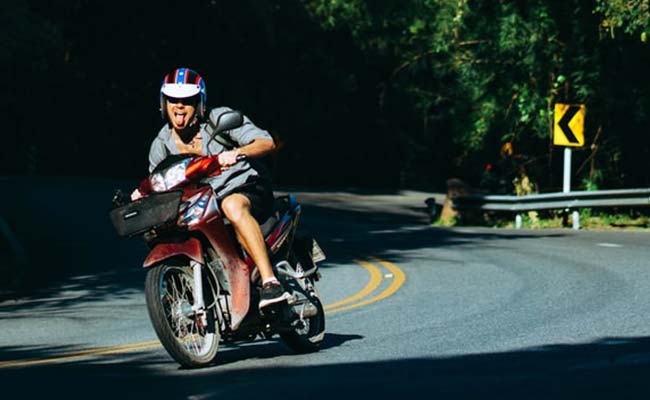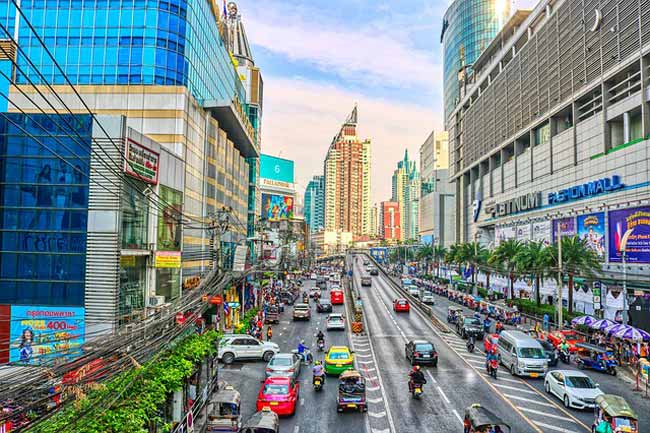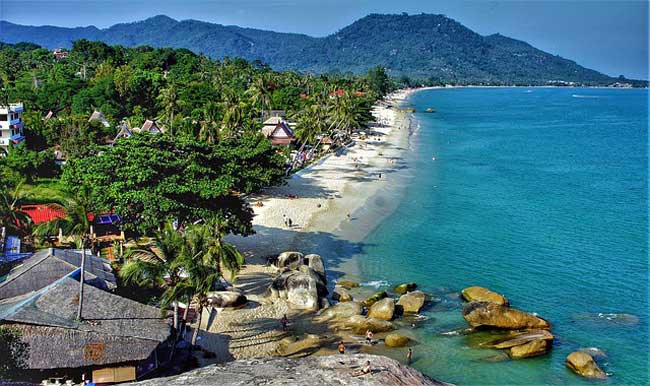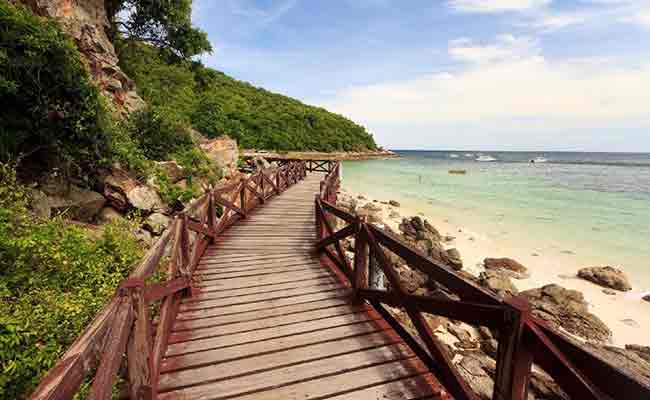Many travelers, and those relocating to Thailand, don't give riding a motorbike a second thought until they arrive and realize it's the easiest and cheapest way to get around.
Suddenly, without having planned it, you find yourself out on the open road on a machine you have zero experience of operating.
When I first arrived in Koh Samui in 2008, a friend took me to a motorbike hire shop.
I was nervous because I'd never ridden a motorbike, and even though it was just a 100 cc bike, to me it seemed much bigger.
Guess what? I crashed it on the first day after doing the most stupid thing.
We'd parked up outside the resort, and I was asked to move the bike because I was partially blocking an entrance.
Instead of wheeling it along without the engine on, or getting on and started the bike to move it forward, I started the bike and turned the accelerator handle to move it forward. My friend shouted; “what are you doing”!
I panicked and didn't release the accelerator. My hand was just stuck there, powering it on. The bike shot forward!
I ran with it a little and then let go. It flew off about ten meters and crashed. Thankfully it survived with just a few scrapes, and I wasn't injured either.
I was lucky that this was a stationary incident and wasn't more serious. What an idiot.
Motorbike accidents are so common in Thailand, even among experienced riders, let alone novices who've just stepped off the plane, with little sleep and probably too many drinks the night before.

Helmet, good. Sensible footwear, good. Long sleeves, good. Riding fast around corners, bad!
12 Motorbike Safety Tips for a Safe Holiday
I've met tourists who've broken bones, burnt legs on the exhaust, hurt feet and scraped up various parts of their bodies; and of course read the more tragic stories over the years in local papers.
You may have seen the occasional fundraiser page going round on Facebook for a foreign national seriously injured in a bike accident. Quite often travelers are uninsured, or they exhaust their coverage and need further treatment and can't leave or fly back home.
Now, without wanting to sound like your mother, or wanting to strike fear into anyone thinking of hiring a motorbike when they arrive in Thailand, I felt like this post was the responsible thing to do.
I figure that my story of inexperience, and the incidents I've seen and heard about over the years, might help you avoid having an accident.
So here are my 12 top tips for a relatively safe motorbike experience in Thailand.
BTW: the words motorbike and motorcycle (pronounced “motorcyc”) are often used interchangeably in Thailand.
‘Moped' is also commonly used by tourists to describe the smaller engine sized bikes you commonly see Thais riding, although a moped, strictly speaking, is a bike under 50 cc. Scooter is another word used to describe bikes under 250 cc.
1. Bring Your License
If you don't have a driving license back home that covers riding motorbikes, then you don't automatically qualify for one by flying into Thailand.
When you hire a bike, the shop should ask for your license and take a copy of it as proof.
Yes, I know, thousands of visitors each year rent bikes and aren't asked for a license. But it's illegal.
So while a license doesn't keep you safe on the bike, if you do have an accident, it will keep you safe from being charged with driving without a license.
2. Get Some Experience Before You Arrive
Seriously, if you are relocating or going traveling and think you will be hiring or buying a motorbike, take a course back home before you leave.
Just having an instructor for a day will make a massive difference to your safety.
Sure, the roads are different back home, but gaining an understanding of how the bike works and what hazards you need to be aware of is so valuable.
Perhaps you have a friend who rides a motorbike? If so, get some lessons on private land. Any prior experience gained from a seasoned rider will be of huge value to your confidence.
3. Take a Course in Thailand
Obviously you won't have time to do a course on a 2-week holiday, but if you're setting up home here or planning on traveling for a number of months in Asia then why not take a course.
If you're staying permanently, then you will need to do the proper bike test and get a license going forward.
A number of bike shops in Bangkok offer lessons. For example, BSR Bike Shop offers the following:
- Automatic: 30 mins – 800 baht (1-hour 1,200 Baht)
- Manual: 30 mins – 900 baht (1-hour 1,500 Baht)
Similarly, the Global Rider Academy in Chiang Mai offers a 3.5 hour course for $39.95 – Bargain!
The Asia Moto Club in Phuket offers a basic 3-hour training for $40.
I really do recommend a course for absolute beginners. This relatively small amount of money could save your life.
4. Wear a Helmet, Always
This one is mostly for the men, because, without wanting to generalize, it does seem to me that younger lads are more averse to wearing a helmet than the ladies.
Okay, so it doesn't look very cool, and it's hot, but here's the thing: you will most likely recover from a broken leg, but you most likely won't recover from brain damage.
Just put on the damn helmet. You might be a safe rider, but it's others on the roads you need to be concerned about.
5. Check Your Bike Over for Faults
Do you know what a bald tyre looks like? Do you know what brake fade is? Would you know if the steering wasn't right?
I've only ever had to take a motorbike back to a hire shop once because of a strange engine noise, but you should always give a bike a once over when you first hire it.
Check the tyre tread, perform a few complete turns to make sure the steering feels normal, and make sure the brakes are effective.
You don't need to be mechanic to know that a tyre looks old and worn, or that the brakes seem to fade and take a little longer to stop than you'd expect. But having prior experience with a bike – another reason to get some before you start riding alone – helps identifying these issues.
6. Kill Your Speed
Speed kills. Period. The slower you ride the less likely you are to have an accident. Going slowly also gives you more time to anticipate navigating a hazard.
The party won't miss you for being a few minutes late. The beach will still be there if you go 20 kph slower.
You will also be less likely to cause an accident.
About 20,000 people die each year on Thai roads, which are among the deadliest in the world. Around three-quarters of those fatalities are people riding two- or three-wheeled vehicles (1).
7. Don't Drive Too Close
If the car in front breaks suddenly, which is very common in Thailand, you'll go straight into the back of it. And you'll be liable for the damage. The hire shop will insure your bike but you will pay excess.
Another good reason to keep your distance is because lorries and trucks, in particular, can't see you when you're too close.
Don't ride in blind spots.
The golden rule is that if you can't see a vehicle's mirrors they can't see you. If you're riding close up to a lorry, to the left or the right or the vehicle, and the lorry makes a turn, you will go splat into the side of it.
Keep your distance.
A study found that 80% of motorcycle accidents were caused by a car cutting into traffic. Most of the motorcycle victims were riding at normal speeds (20-60kph) and not under the influence of alcohol or sleepiness.
8. If You Don't Feel Safe, Just Pull Over
This is something I do if I don't feel comfortable in the traffic.
Perhaps there's an aggressive driver switching lanes and getting agitated, or a few trucks close by that make you feel uneasy. Just find a safe spot to pull over and let the hazard pass before continuing your journey.
9. Say No to Guilt & Peer Pressure
I get it: you've just landed in Thailand and your friends are super excited to hire mopeds and get exploring.
They're all egging each other on to get started. But you feel nervous. You've never ridden a bike before and you don't really want to. The thought of it scares you, but you don't want to be a party pooper.
Don't do it. Never let peer pressure or not wanting to let the side down sway you into doing something you don't want to do, especially when it comes to something as serious as riding a motorbike for the first time.
Simply hire an extra helmet and choose the most experienced rider in your group to saddle up with. And don't be afraid to ask that person to slow down when you feel he/she is pushing the limits.
10. Don't Drink & Drive
Sounds cliché, I know, but seriously, don't.
The majority of serious accidents happen when people are intoxicated. Take a taxi or motorbike taxi if you're going out for the night. I know it's expensive on the islands but a crash could see your holiday spent in hospital rather than on a beach.
11. Wear Safe Clothes
Ideally you'd be fully suited up in protective motorbike gear and your helmet. But that's not going to happen, nowhere near in fact. It's hot and you want convenience, not having to change clothes every time you hop on the bike.
At the very least, though, you should be wearing jeans as a layer of protection – in case you were to fall off – and cover bare arms with a similarly suitable material.
But that's unlikely too, right?
Okay, well, just don't ride around in Speedos or a bikini. Do your best to at least cover your skin with some form of material. That way, if you do come off your bike, there will be less skin left on the road.
Lastly, try and avoid wearing flip-flops. Feet are pretty delicate and easy to injure. Trainers or canvas shoes that cover your feet grip better and will protect them from injury.
I know this last piece of advice will be lost on short journeys to beaches, shops and bars, but perhaps you'll consider more suitable clobber when you go for longer rides.
12. Get Travel Insurance!
Okay, I know I said 10, but having mentioned this briefly earlier on I wanted to drive it home (no pun intended).
Most of us just assume that our travel insurance covers the riding of motorbikes. It seems like an everyday thing to do. But with the high number of accidents and fatalities in Thailand not every policy will cover this activity.
I also tend to assume that everyone takes out travel insurance before they holiday in Thailand. Turns out some people aren't that sensible!
If you do intend to ride a motorbike in Thailand, make sure your travel insurance policy, or international health insurance policy, whichever you have, covers you to do so.
If you're not covered and have an accident, you could end up with a hefty medical bill that you can't pay. Check out World Nomads for a quote that covers you on a bike, and for other outdoor activities of your choosing.
——
That's it! I'll stop sounding like your mother now. Ride safely and enjoy your trip!
—
More Travel In Thailand Tips
Booked a Hotel Yet?:
The best deals for Thailand are found here on Agoda.
Need Some Help Packing?:
Here is a checklist to help you organize and pack. Click here.
Staying longer than a holiday?
Learning Thai is easier than you think. I use Thaipod101. It is free to get started.
Last Updated on



Longfinger Kirk says
Mar 05, 2022 at 6:08 pm
TheThailandLife says
Mar 05, 2022 at 10:32 pm
REM says
Mar 11, 2022 at 10:02 am
TheThailandLife says
Mar 16, 2022 at 8:21 pm
Yohan says
Also check on the motorcycle if the tax label is valid and the cheap obligatory insurance is paid.
Quite a lot of foreigners think, they don't need any driving permit or a driving permit for a car is acceptable.
Expect traffic checks by police and find yourself in trouble if they find something which is not in order.
Feb 24, 2022 at 5:54 pm
TheThailandLife says
Mar 16, 2022 at 8:22 pm
Ken F says
All this being said I should point out that not everyone is going to be as lucky as I have been. I actually eat lunch most days at a place that overlooks one of these checkpoints and I can tell that some of the people who get stopped have found themselves in deep sh#t. So its always best not to even risk it.
Mar 19, 2022 at 4:17 pm
Ken F says
Of course seeing as how Thailand is the second most dangerous country in the world to drive in it should come as no surprise that even very experienced riders with excellent defensive driving skills can get into accidents here. In fact, motorbike accidents are so common that if you are walking around Phuket with a limp or other injury, both Thais and other westerners will turn to you and say “motorbike accident”? And 9 out of 10 times the answer to that question will be “yes”. By the way, its actually probably better not to let Thai people know about your accident because from that point forward they will think of you as just another one of those stupid Farangs who doesn’t know how to drive in Thailand. It doesn’t matter if you were driving slowly and attentively at the time or that the accident was 100% the other guys fault. You can explain this to them 100 times and they will still think that it was your own carelessness that caused the accident. Even your own girlfriend might think this. This despite the fact that she may be the one who is a bad driver because she refuses to ever wear a helmet, often rides with one hand, and goes way too fast entering blind corners in which a vehicle could easily be on her side of the road coming in the opposite direction. Anyway, if you want to avoid the stigma just keep the accident to yourself.
By the way Peter, I have to take issue with you referring to a motorbike as a “moped” even though the misnomer is so commonplace now that even motorbike advertisers sometimes use the term. A true moped has bicycle pedals, no larger than a 50cc motor, and no transmission. They first briefly gained popularity in the States back in the 1970’s and then disappeared almost as fast. Anyway, because motorbikes in Southeast Asia almost exclusively use and under-bone frame design, as mopeds did, when westerners saw these motorbikes in Asia they mistakenly started calling them “mopeds” and the misnomer just stuck. Also while I’m on the topic, the main difference between a motor scooter and a motorbike or motorcycle (besides the obvious smaller wheels and flat foot pan on the scooter) is that on the scooter the engine and transmission is actually part of the suspension. This not only makes them tail heavy but it also means that the unsprung weight is extremely high on the rear suspension, all things that make for less than stellar handling characteristics. I have to admit though that you can’t beat those CVT transmissions on the motor scooters for getting up steep hills quickly with even a very small motor.
Feb 19, 2022 at 2:17 pm
TheThailandLife says
Feb 20, 2022 at 6:13 am
Ken F says
Mar 19, 2022 at 3:30 pm